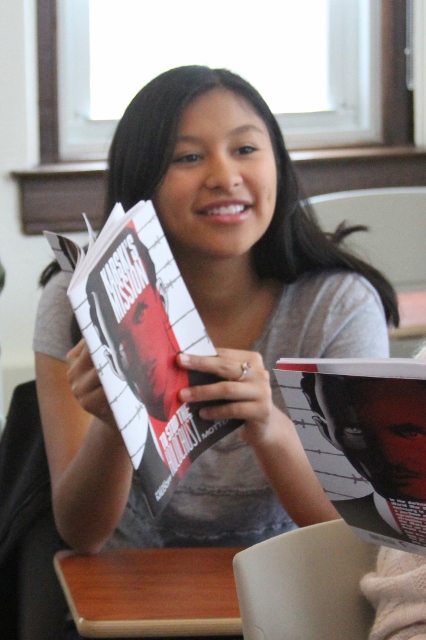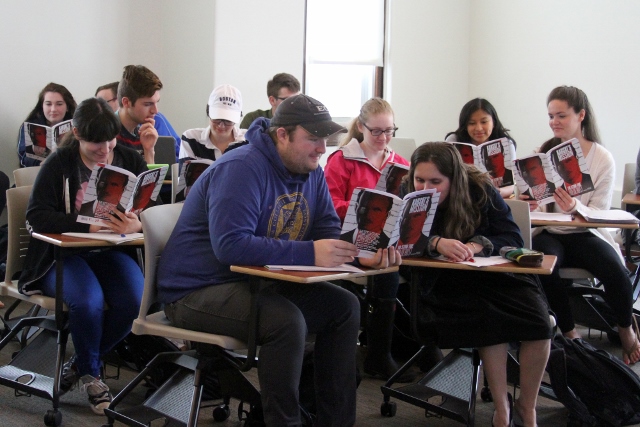Students in Emmanuel College's History 2120 class “Europe in the Era of World War” read the illustrated story Karski’s Mission: To Stop the Holocaust and their teacher, Melanie Murphy has shared with us this compilation of their comments.
“Students were impressed by the efforts of Karski and the Polish Resistance to get word to world leaders, including Anthony Eden and Franklin Roosevelt of the brutalities and horrors of the Holocaust. They called Karski's mission ‘heroic and significant.’ The response of the President of the United States that we would seek to win the War first and only then deal with War crimes took students aback. They were also struck by the fact that Karski was haunted for the rest of his life by all the horrors he had seen. Perhaps the study of World War II as well as of contemporary events made the trauma of being a witness more real to them.
 They observed that Karski, like Nechama Tec, another Pole of that time whose memoir we read, had to disguise himself and change his identity to survive and fulfill his mission. Nechama Tec was Jewish and had to pretend to be Catholic, when hiding in plain sight in Kielce, while Karski had to assume a number of different disguises and identities in his travels and missions. The necessary distortion of identity and a sense of not being safe while being yourself was shocking yet believable to them. They also observed that Karski’s promising diplomatic career was derailed because of the WWII events, never to be recovered, and perhaps because they are deciding on their career paths, they realized it must have been a strong blow to Karski.
They observed that Karski, like Nechama Tec, another Pole of that time whose memoir we read, had to disguise himself and change his identity to survive and fulfill his mission. Nechama Tec was Jewish and had to pretend to be Catholic, when hiding in plain sight in Kielce, while Karski had to assume a number of different disguises and identities in his travels and missions. The necessary distortion of identity and a sense of not being safe while being yourself was shocking yet believable to them. They also observed that Karski’s promising diplomatic career was derailed because of the WWII events, never to be recovered, and perhaps because they are deciding on their career paths, they realized it must have been a strong blow to Karski.
Emmanuel College [Boston, MA] is a Catholic school and many students particularly noted that Karski was raised a Catholic with a tradition of peaceful relationship and concern for Jewish Poles. The work shows Karski as equality minded but the society as intolerant to Jews. With effective economy of words and pictures, Karski’s Mission: To Stop the Holocaust conveys significant social, political, military and resistance history. Some students highlighted Karski's Polish patriotism; others felt that Karski's main passion, at least after the war was over, was to educate.
In their comments, several students compared Karski’s Mission to another graphic history we have read, Shigeru Mizuki's Hitler, and remarked that they preferred the drawings in the Karski book. They were more realistic and clear, not impressionistic or coded, and with the weight of the story, they didn't want to go through an interpretive layer in the drawings.
Another fact from Karski’s story that struck the students was his years of silence after the war – he had spent many months trying to tell powerful leaders of the brutality in the Warsaw ghetto and the transit camp, and of the blatant murder he had seen, yet after the war, he chose not to speak about it. It took the interview by Claude Lanzmann for his long documentary to make the thoughts and memories come back again. Karski was haunted for the rest of his life by his experiences and students noted that he felt it appropriate to be haunted by what he had seen. ‘He learned that you have to speak up for those who cannot, even if it puts you at risk.’
They thought Karski's life shows that one should never give up hope and should keep trying, even in the face of vast obstacles. Resilience and defiance are the lessons they drew from Karski's example. There was a strong sense that in great trouble, you may only be able to rely on yourself, and that people to whom you turn for help would rather look the other way than help. Although Karski stepped out to help others, he was unable to convince others to do so. His concern was met with unconcern and some said this makes the story a dark one. Perhaps as a career diplomat who ‘understood the nuanced world of international relations’ he was less shocked than he might have been by the response to his message. It was the evil of Nazi crimes more than the passivity of the allies which haunted him. Karski learned that ‘society can be cruel’ but that we must continue to remember and honor the lost.”
See the announcement about the publication of Karski’s Mission: To Stop the Holocaust and Littleton High School students’ comments about the comic book.